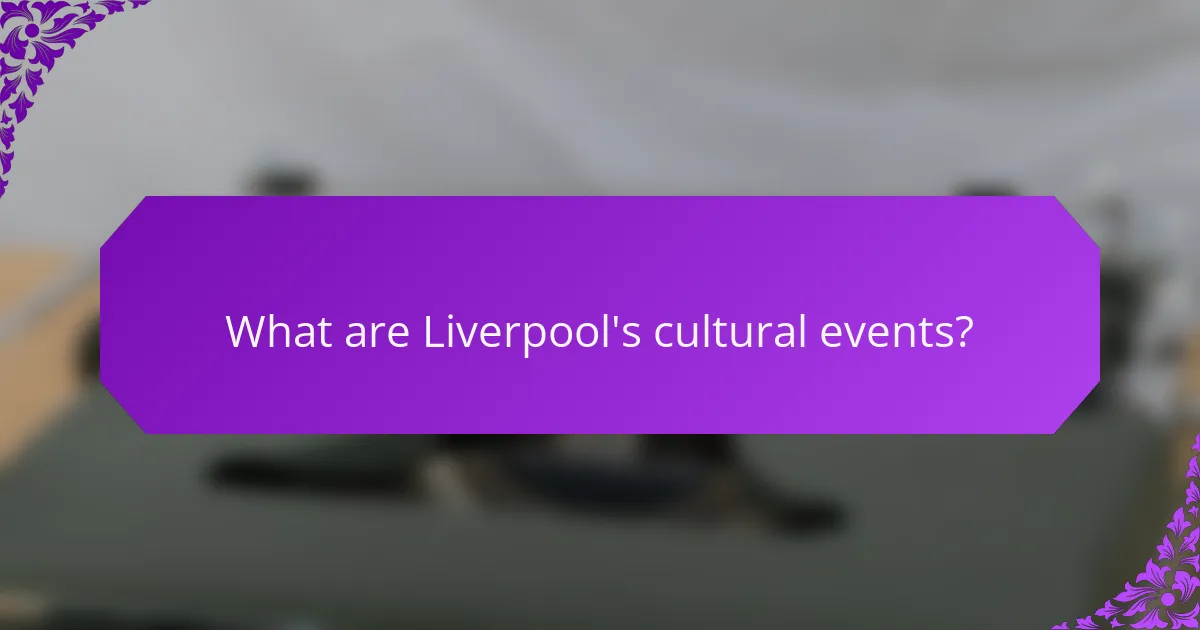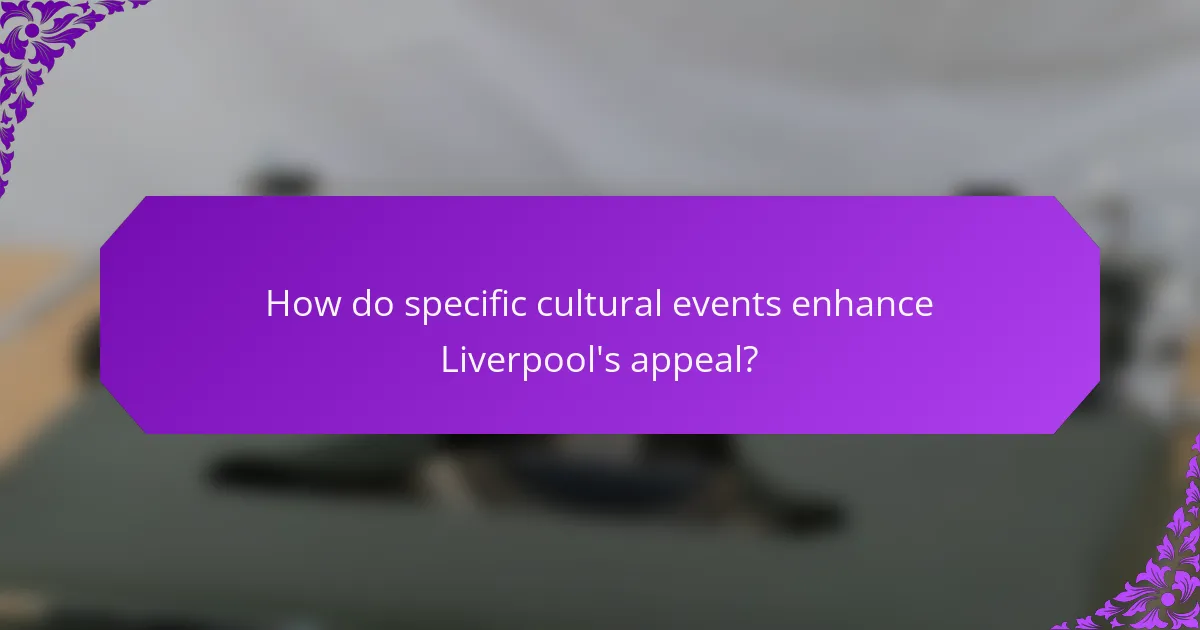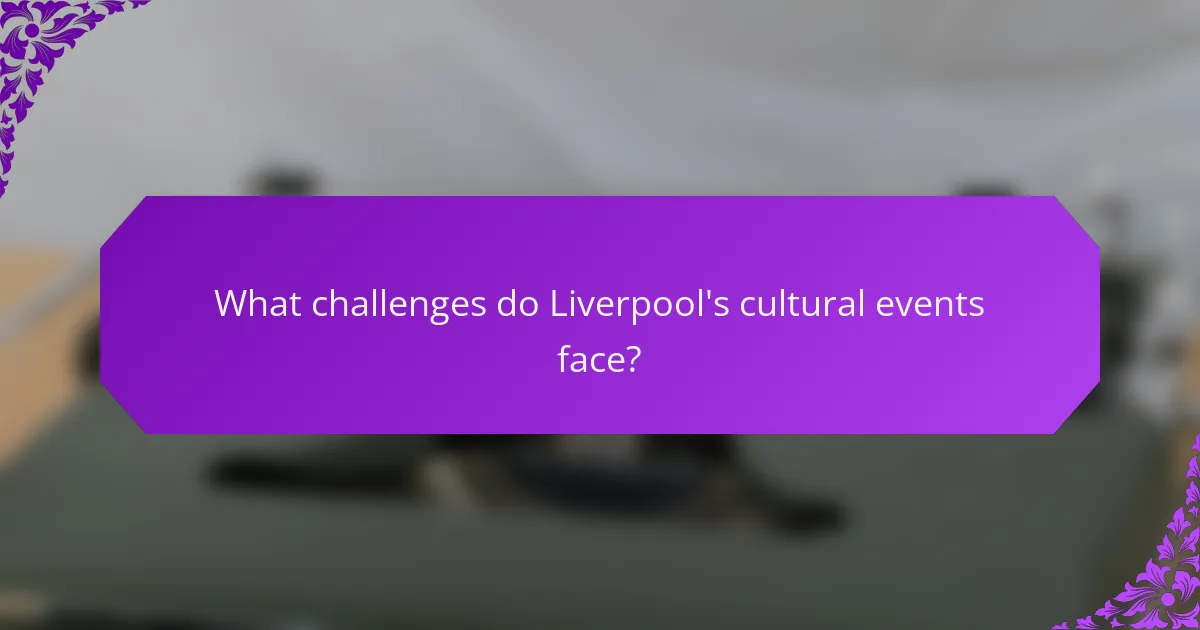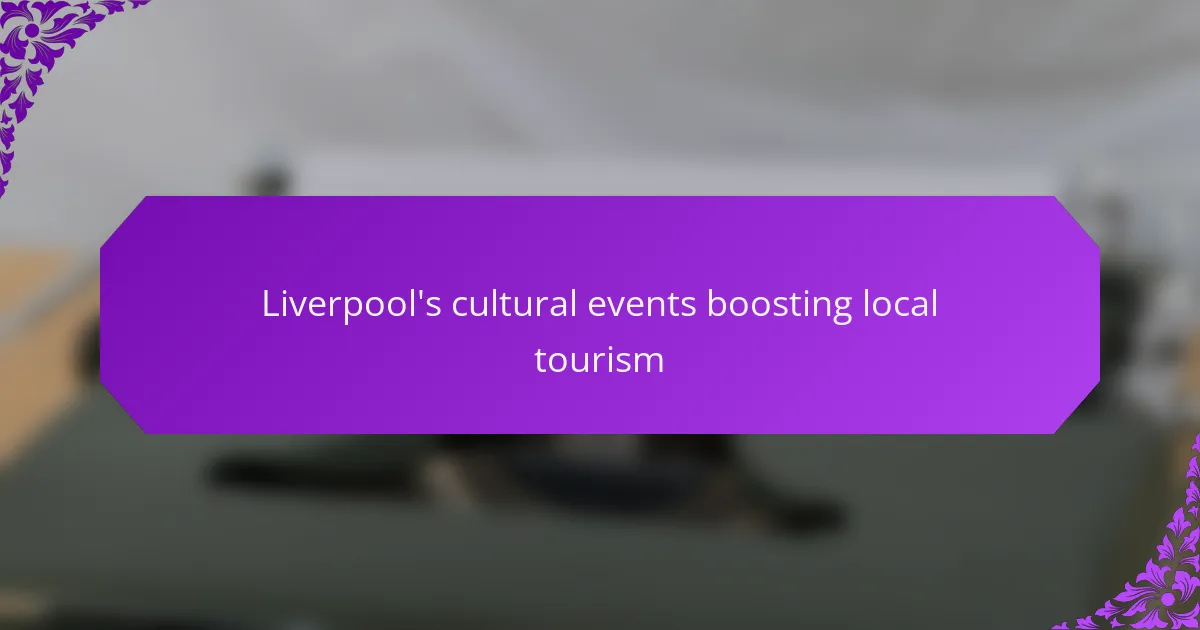Liverpool’s cultural events play a crucial role in boosting local tourism and enhancing community engagement. Key events include the Liverpool International Music Festival, the Liverpool Biennial contemporary art festival, the Liverpool Food and Drink Festival, and the Merseyside Dance Initiative. These events not only showcase the city’s artistic and culinary diversity but also significantly contribute to the local economy by attracting large crowds, with the Liverpool International Music Festival alone drawing over 100,000 visitors in 2019. However, challenges such as funding issues, competition from other cities, and logistical hurdles can impact the success and attendance of these events.

What are Liverpool’s cultural events?
Liverpool hosts a variety of cultural events throughout the year. These events include the Liverpool International Music Festival, which showcases diverse musical talent. The Liverpool Biennial is a prominent contemporary art festival occurring every two years. The city also celebrates the Liverpool Food and Drink Festival, highlighting local cuisine and beverages. Additionally, the Merseyside Dance Initiative promotes dance through various performances and workshops. The city’s annual LightNight event features art installations and performances across multiple venues. These events significantly enhance local tourism by attracting visitors and promoting cultural engagement.
How do these events contribute to local tourism?
Cultural events in Liverpool significantly enhance local tourism. They attract visitors from various regions, increasing foot traffic in the city. Events like music festivals and art exhibitions showcase Liverpool’s unique cultural heritage. This exposure often leads to longer stays and increased spending in local businesses. According to a report by VisitBritain, events can boost visitor numbers by up to 30%. Additionally, cultural events foster community pride, encouraging locals to participate and promote tourism. The economic impact includes job creation in hospitality and retail sectors. Overall, these events are vital for Liverpool’s tourism growth.
What types of cultural events are most popular in Liverpool?
Music festivals are among the most popular cultural events in Liverpool. The city hosts events like the Liverpool International Music Festival, attracting thousands each year. Additionally, the Liverpool Sound City festival showcases emerging artists and established acts. Art exhibitions are also significant, with venues like the Tate Liverpool offering diverse displays. The city’s film festivals, such as the Liverpool Film Festival, draw cinephiles from various regions. Furthermore, cultural celebrations like the Liverpool Chinese New Year Festival highlight the city’s multiculturalism. These events contribute to local tourism by boosting visitor numbers and engagement.
How do cultural events attract tourists to Liverpool?
Cultural events attract tourists to Liverpool by showcasing the city’s rich heritage and vibrant arts scene. Events like the Liverpool International Music Festival and the Biennial Art Festival draw large crowds. These festivals highlight local talent and provide unique experiences. Tourists are often attracted by the opportunity to engage with local culture. In 2019, Liverpool welcomed over 1.5 million visitors for cultural events alone. This influx boosts the local economy significantly. Cultural events also promote community engagement and pride. The city’s reputation as a cultural hub continues to grow, further attracting visitors year after year.
Why are cultural events important for Liverpool’s economy?
Cultural events are vital for Liverpool’s economy because they drive tourism and local spending. These events attract visitors from outside the region, increasing hotel occupancy and restaurant sales. For instance, the Liverpool International Music Festival draws thousands of attendees each year. In 2019, it was reported that cultural events contributed over £1 billion to the local economy. Additionally, cultural events create jobs in various sectors, including hospitality and retail. They also enhance the city’s global reputation as a cultural hub. Overall, cultural events stimulate economic growth and community engagement in Liverpool.
What economic benefits do cultural events bring to local businesses?
Cultural events bring significant economic benefits to local businesses. They increase foot traffic in the area, leading to higher sales for retailers and restaurants. For example, festivals and art exhibitions can attract thousands of visitors. This influx boosts demand for local services, including accommodations and transportation. According to a study by the Liverpool City Council, cultural events contribute millions to the local economy annually. They also create job opportunities in various sectors. Local businesses often see an increase in customer engagement and brand visibility during these events. Overall, cultural events serve as a catalyst for economic growth in the community.
How do cultural events impact job creation in Liverpool?
Cultural events significantly impact job creation in Liverpool. These events attract tourists, leading to increased demand for services. This demand stimulates hiring in sectors such as hospitality, retail, and entertainment. According to a report by Liverpool City Council, major events like the Liverpool International Music Festival create thousands of temporary jobs. Additionally, cultural festivals often require local vendors and artists, further boosting employment opportunities. The economic activity generated by these events supports long-term job growth in the region. Overall, cultural events serve as a catalyst for job creation in Liverpool.

How do specific cultural events enhance Liverpool’s appeal?
Specific cultural events enhance Liverpool’s appeal by attracting tourists and fostering community engagement. Events such as the Liverpool International Music Festival draw large crowds, showcasing local talent. The city’s hosting of the Biennial contemporary art festival highlights its artistic vibrancy. Additionally, the annual Liverpool Food and Drink Festival promotes local cuisine, enticing food enthusiasts. These events not only celebrate Liverpool’s cultural diversity but also stimulate the local economy. In 2019, the Liverpool International Music Festival alone attracted over 100,000 visitors. Such statistics illustrate the significant impact of cultural events on tourism and local pride.
What are some key annual cultural festivals in Liverpool?
Liverpool hosts several key annual cultural festivals. The Liverpool International Music Festival showcases diverse musical talent each summer. The Liverpool Biennial is a prominent contemporary art festival occurring every two years. The Liverpool Food and Drink Festival celebrates local cuisine and culinary talent every September. The Africa Oye Festival is the UK’s largest free celebration of African music and culture, held annually. The Chinese New Year celebrations feature vibrant parades and cultural displays each January. These festivals contribute significantly to local tourism and cultural engagement.
How does the Liverpool International Music Festival influence tourism?
The Liverpool International Music Festival significantly boosts tourism in the city. It attracts thousands of visitors annually, contributing to local economy growth. The festival features diverse musical acts, appealing to various demographics. This variety encourages longer stays and increased spending in the area. According to studies, events like this can generate millions in revenue. Local hotels, restaurants, and attractions benefit from the influx of tourists. The festival also enhances Liverpool’s cultural reputation, making it a desirable destination. Overall, the festival plays a crucial role in promoting tourism in Liverpool.
What role does the Liverpool Biennial play in attracting visitors?
The Liverpool Biennial plays a significant role in attracting visitors to the city. As the UK’s largest contemporary art festival, it showcases innovative artworks from national and international artists. This event occurs every two years, drawing art enthusiasts and tourists alike. In 2021, the Biennial attracted around 500,000 visitors. The festival enhances Liverpool’s cultural reputation and stimulates economic growth. Local businesses benefit from increased foot traffic during the event. The Biennial also fosters community engagement through workshops and educational programs. Overall, it significantly contributes to Liverpool’s tourism sector.
How do cultural events promote community engagement?
Cultural events promote community engagement by providing opportunities for social interaction. They bring diverse groups together, fostering connections among residents. Participation in these events encourages a sense of belonging. Engaged communities often collaborate on projects and initiatives. Research shows that cities with vibrant cultural events experience increased civic participation. For example, a study by the National Endowment for the Arts found that cultural activities enhance community ties. Additionally, these events often highlight local traditions, reinforcing cultural identity. This shared experience can lead to greater community pride and involvement.
What initiatives exist to involve local residents in cultural events?
Initiatives to involve local residents in cultural events include community engagement programs, volunteer opportunities, and collaborative projects. Community engagement programs often invite local residents to participate in planning and executing events. Volunteer opportunities allow residents to contribute their time and skills during cultural festivals. Collaborative projects may involve partnerships between local artists and community groups. These initiatives foster a sense of ownership and pride among residents. They also enhance the cultural vibrancy of events. Research shows that local involvement can increase attendance and support for cultural activities. This, in turn, boosts local tourism in cities like Liverpool.
How do cultural events foster a sense of community pride?
Cultural events foster a sense of community pride by celebrating local heritage and traditions. They provide a platform for residents to showcase their unique cultural identity. This engagement reinforces social bonds among community members. Participation in these events often leads to increased visibility of local talent and creativity. When residents see their culture represented, it enhances their connection to the community. Studies show that communities with strong cultural events report higher levels of civic engagement. Events like festivals and art exhibitions draw attention to local history and achievements. This collective celebration strengthens a shared sense of belonging and pride in the community.

What challenges do Liverpool’s cultural events face?
Liverpool’s cultural events face several challenges. Funding is a significant issue, as many events rely on grants and sponsorships. Competition from other cities also impacts attendance and participation. Weather conditions can disrupt outdoor events, affecting planning and logistics. Additionally, attracting diverse audiences remains a challenge for organizers. Economic fluctuations can influence ticket sales and overall participation. Lastly, logistical issues such as transportation and venue accessibility can hinder event success.
How do funding and sponsorship affect cultural events in Liverpool?
Funding and sponsorship significantly enhance cultural events in Liverpool. These financial resources enable organizers to secure venues, hire talent, and promote events effectively. For instance, events like the Liverpool International Music Festival benefit from sponsorships, increasing their scale and reach. Funding also allows for the inclusion of diverse programming, attracting a wider audience. According to a report by Liverpool City Council, cultural events contribute over £100 million annually to the local economy. This economic boost is often linked to increased tourism, as visitors are drawn to well-funded and well-promoted events. Overall, funding and sponsorship play a crucial role in the success and sustainability of cultural events in Liverpool.
What are the impacts of economic downturns on cultural event attendance?
Economic downturns negatively impact cultural event attendance. During recessions, disposable income decreases for many individuals. This leads to reduced spending on entertainment and leisure activities. Cultural events often see lower ticket sales and attendance rates as a result. For example, a study by the National Endowment for the Arts found that attendance at arts events dropped by 20% during the 2008 financial crisis. Additionally, organizations may face budget cuts, limiting their ability to host events. Economic uncertainty also leads to decreased consumer confidence, further reducing participation in cultural activities.
What strategies can be implemented to improve cultural event tourism?
Enhancing cultural event tourism can be achieved through targeted marketing, community engagement, and partnerships. Effective marketing strategies include utilizing social media platforms to reach broader audiences. Collaborating with influencers can amplify event visibility. Community engagement fosters local support and participation. Involving local artists and businesses can create a more authentic experience. Forming partnerships with travel agencies can facilitate package deals. Offering incentives like discounts for early bookings can attract more visitors. According to a study by the World Tourism Organization, cultural events significantly boost local economies, highlighting the importance of these strategies.
How can marketing efforts be enhanced to attract more tourists?
Marketing efforts can be enhanced to attract more tourists by leveraging digital platforms and targeted advertising. Utilizing social media channels allows for real-time engagement with potential visitors. High-quality visuals of cultural events can create excitement and interest. Collaborating with influencers can broaden reach and credibility. Creating tailored packages that highlight local attractions can provide added value. Data-driven marketing strategies can identify key demographics and preferences. According to VisitBritain, effective marketing can increase tourist spending by up to 20%. Engaging storytelling about Liverpool’s unique cultural offerings can resonate with diverse audiences.
What partnerships can be formed to support cultural events?
Partnerships that can be formed to support cultural events include collaborations with local businesses, government agencies, and educational institutions. Local businesses can provide sponsorships or in-kind support, enhancing event visibility. Government agencies can offer funding, permits, and logistical support, ensuring compliance with regulations. Educational institutions can engage students and faculty for programming and volunteer support, fostering community involvement. Historical data shows that such partnerships can significantly increase attendance and local engagement in cultural events. For instance, the collaboration between Liverpool City Council and local businesses during the Liverpool International Music Festival resulted in a 30% increase in attendance.
What are the best practices for attending Liverpool’s cultural events?
Plan your visit in advance. Check the event schedule online for dates and times. Purchase tickets early to secure your spot. Arrive early to avoid long lines and find good seating. Familiarize yourself with the venue layout for easier navigation. Dress appropriately for the weather and the event type. Engage with local culture by trying local food and drinks. Respect the event’s rules and guidelines for a positive experience.
Liverpool’s cultural events serve as a significant driver of local tourism, showcasing a variety of festivals such as the Liverpool International Music Festival, Liverpool Biennial, and Liverpool Food and Drink Festival. These events not only attract thousands of visitors annually, boosting the local economy and creating jobs, but also foster community engagement and pride. The article explores the impact of cultural events on tourism, the economic benefits for local businesses, and the challenges these events face, highlighting the importance of effective marketing and partnerships to enhance visitor experiences.
